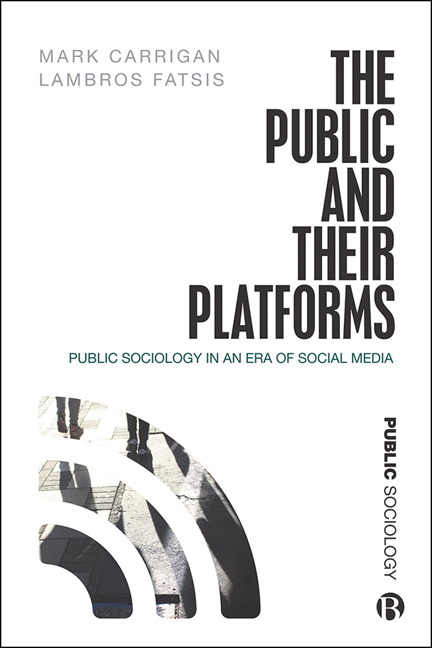Book contents
- Frontmatter
- Contents
- Acknowledgements
- Series Editors’ Preface
- Introduction
- 1 Defining ‘the Public’
- 2 The History of Platforms
- 3 Between Publics and Platforms
- 4 Sociology and its Platforms
- 5 The Past, Present and Future of Public Sociology
- 6 Making Sociology Public
- 7 Making Platforms Public
- 8 Assembling Public Sociology
- Notes
- References
- Index
Introduction
- Frontmatter
- Contents
- Acknowledgements
- Series Editors’ Preface
- Introduction
- 1 Defining ‘the Public’
- 2 The History of Platforms
- 3 Between Publics and Platforms
- 4 Sociology and its Platforms
- 5 The Past, Present and Future of Public Sociology
- 6 Making Sociology Public
- 7 Making Platforms Public
- 8 Assembling Public Sociology
- Notes
- References
- Index
Summary
You are holding a book of sociology about public life and the technologies that make it possible. But you are reading it during a period when our experience of being public is largely mediated through being online. This seems like the perfect moment to be thinking about the contents of this book. The pandemic has done much to challenge our conceptions and practice of what public life is, how it has been or can be understood sociologically and what role social media platforms play in enabling or compromising our ability to occupy, create and identify ourselves with or as a public. Just like a virus forced us to confront the ills of social life in pre-COVID times, while also prompting us to reimagine its aftermath in a more convivial, equitable, less extractive and more human manner, this book aspires to a similar reconstructive logic without leaving a trail of devastation in its wake. What we have put together in book form, therefore, is an attempt at throwing our ideas of public life, technological innovations and sociological scholarship up in the air; as an invitation to a conversation about how we can make such resources work for us as ingredients of a citizenship which traverses the conventional distinctions of ‘online’ and ‘offline’.
Rather fittingly, this book's life has been shaped by some of the issues it addresses. Much of its content was mulled over in public or semipublic spaces – pubs, cafés and library courtyards – where its authors met to discuss how to rethink and write about public sociology as an endeavour that could be practised as a relationship between intellectuals, publics and platforms of communication. Both of us were ambivalent about how social media could stimulate public life, yet neither of us were satisfied with doing away with them, without attempting to understand how such platforms are designed or what the terms public, sociology and public sociology mean. As a result, we chose to place our dissatisfaction between book covers, resisting the temptation to fetishize offline life, malign online activities or pretend that (public) sociology has all the (right) answers about how to make social life (more) sociable.
- Type
- Chapter
- Information
- The Public and their PlatformsPublic Sociology in an Era of Social Media, pp. 1 - 6Publisher: Bristol University PressPrint publication year: 2021



